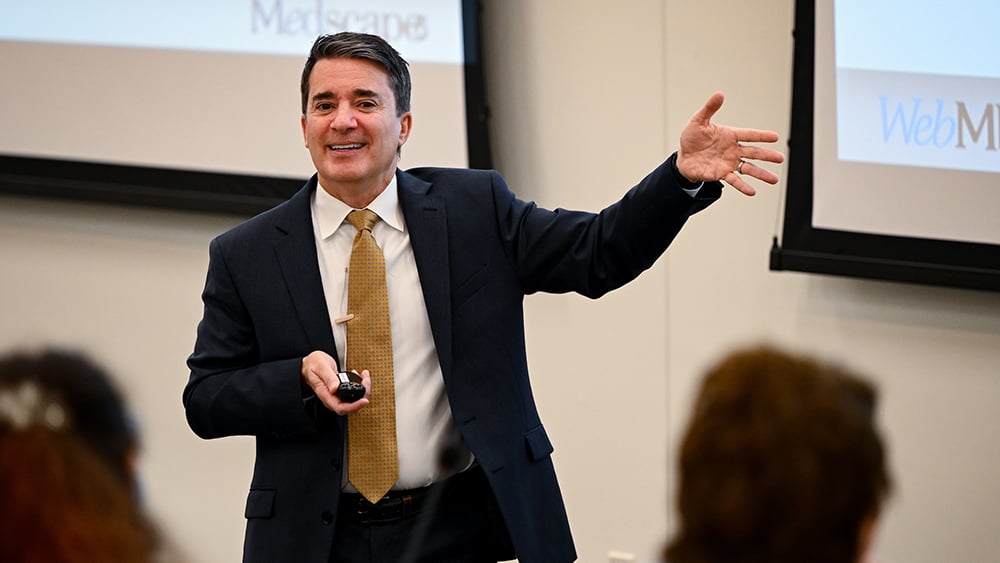After years of using the educational technology company Blackboard, Neumann University switched...
Burnout: A serious issue for nurses

On October 15, Dr. John Whyte, the chief medical officer at WebMD, warned a group of roughly 100 nurses that mental health challenges and burnout could negatively affect the future of the profession and eventual patient outcomes. Whyte delivered his message during homecoming weekend in the Bayada Teaching Auditorium during his hour-long Philadelphia General Hospital Nursing Lecture.
 Dr. John Whyte warned nurses about burnout during a homecoming lecture.
Dr. John Whyte warned nurses about burnout during a homecoming lecture.
Within the past five years, the staffing shortage of nurses has increased. The ratio of nurses to patients in many hospitals and clinics is alarming for several states. In Pennsylvania, there is about a 30-50% nursing shortage. While interest in nursing is at a stable rate, a large percentage of qualified applicants to nursing programs have been turned away the opportunity to join the profession because of a shortage of instructors.
In Whyte’s presentation, he discussed the potential causes that have led to a decrease in enrollment and early retirement in nursing. The recent coronavirus pandemic has greatly impacted nursing, with many people leaving or retiring early. By May 7, 2020, about 88 nurses had died from covid-19. As a result of the shortage of nurses, many people were working longer hours to fill the gap.
According to Whyte, the increase in work hours, number of patients, lack of sleep and support, and emotional strain have led to nurses feeling burnt out mentally and emotionally. Despite the critical role nurses play in health care, many nurses are not receiving the mental health support that is needed to prevent burnout. Seeking mental health has become so stigmatized in society, that many people who may need support refuse to seek help due to fear of feeling judged by coworkers.
In his presentation, Whyte suggests that healthcare managers need to focus on promoting self-care and keeping staffing balanced, allowing for workers not just in nursing, but in other healthcare professions, to keep a balance between work and life. Whyte notes how the skill sets required in nursing have become more extensive as technology and new medical conditions arise in patients.
To keep the nursing profession alive, Whyte emphasizes the importance of having community within the clinics, as well as allowing for each person to have their voice heard. Oftentimes, many nurses are not treated respectfully, and the lack of support leads to many nurses leaving the profession. Burnout affects not only nurses but nursing students as well. At Neumann University, many students in different majors may feel burnt out during midterms or final exams.
Whyte presented the audience with a variety of solutions that are essential to creating growth for the future of nursing.
“Self-care is not selfish. Employers should make it easier to have self-care, to promote self-care, and remove the idea that somehow you're selfish if you want to focus on yourself for a little while,” stated Whyte. With an overbearing schedule, healthcare workers do not prioritize their mental health or self-care. Creating an unhealthy balance in work life leads to burnout. Some forms of self-care that Whyte had suggested include yoga, mindfulness sessions, avoiding “multiple hat syndrome,” sharing stories of joy and loss to create community, cultivating a belonging culture, taking an hour to walk or read a book, and taking time for oneself to enjoy personal hobbies.
Elizabeth Loeper, assistant professor of nursing at Neumann, agrees. “Self-care is critical for nursing and it leads to resilience…self-care is not selfish, and there is a difference between self-care and self-indulgence.” By allowing employees to have better working conditions, both Whyte and Loeper believe that the nursing profession will be able to minimize the shortage of staffing.
Anyone interested in learning more about how mental health will impact the progression of nursing can reach out to Dr. Whyte at his email (jwhyte@webmd.net) or Twitter (@DrJohnWhyte)





